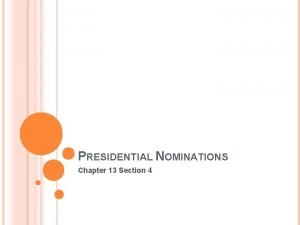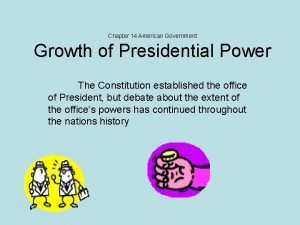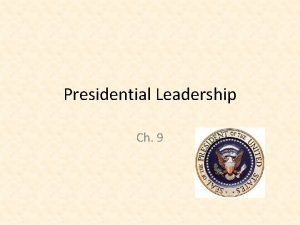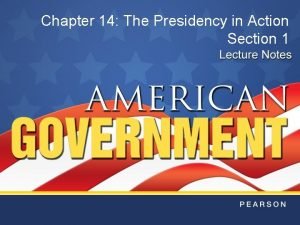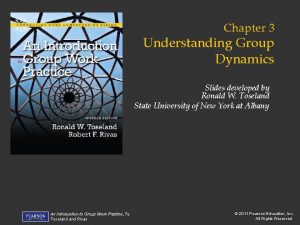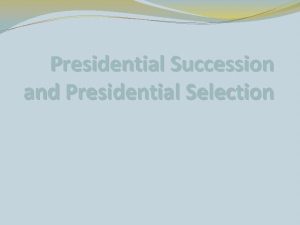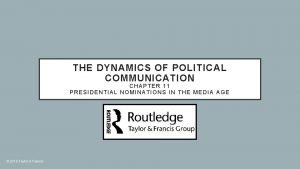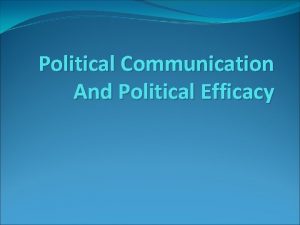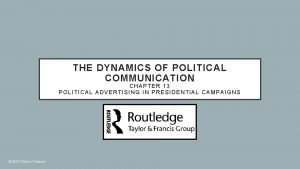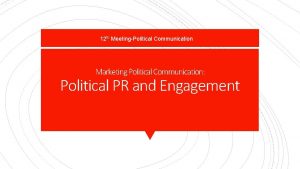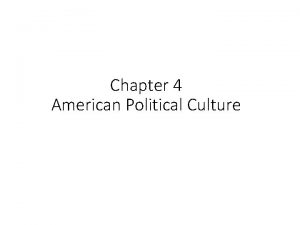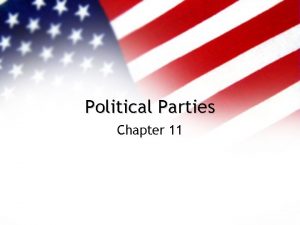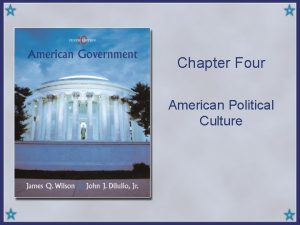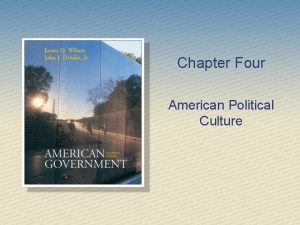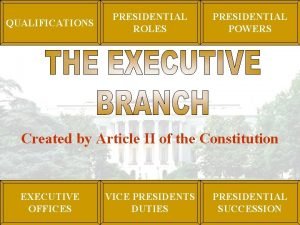THE DYNAMICS OF POLITICAL COMMUNICATION CHAPTER 14 PRESIDENTIAL














- Slides: 14

THE DYNAMICS OF POLITICAL COMMUNICATION CHAPTER 14 PRESIDENTIAL DEBATES © 2018 Taylor & Francis

DEBATE DEFINITIONS • Debates have a long history in American politics • A debate is: • a confrontation • The most famous were the Lincoln– Douglas debates of 1858 • in equal and adequate time • Yet, presidential debates are not authentic debates • on a stated proposition tween e b s e erenc f f i ns? d o i t i e n h i t f e e r wo d What a these t © 2018 Taylor & Francis • of matched contestants • to gain an audience decision (Auer, 1962) • A presidential debate is "the joint appearance by two or more opposing candidates, who expound on their positions, with explicit and equitable provisions for refutation without interruption" (Martel, 1983, p. 2)

FUNCTIONS OF DEBATES FOR POLITICAL COMMUNICATION • For candidates, they are political events • For news media, debates are a premier event in the horse race • For voters, they help decide which candidate best serves their interest, who shares their values, and how the candidate might perform as president • For the political system as a whole, they perform a symbolic function by providing a live, real-time forum in which candidates stand side by side discussing policy issues © 2018 Taylor & Francis

NOMINATION CAMPAIGN DEBATES • Pre-primary and primary campaign debates have become more important in recent years • Gaffes in nomination campaign debates can directly and indirectly influence voters • Pre- and primary campaign debates are usually sponsored by the media • Nomination campaign debates are important because they can legitimize candidacies © 2018 Taylor & Francis

PRESIDENTIAL DEBATE PREPARATIONS • Candidates' consultants engage in a series of strategic considerations including: • Length of time for answers to questions • Whether candidates should sit or stand • If candidates should be able to take notes these e k i l s • Podium height al cue r e tes? h a p b i r e e d p l hy are n presidentia Wothers • Many nt i importa © 2018 Taylor & Francis • These are all ELM peripheral cues that can influence audience impressions • Strategists try to tamp down expectations for their candidate to enhance the effect of a good performance or minimize the effect of a poor performance

DEBATE FORMATS • Press conference: a group of preselected reporters ask candidates questions • Single moderator: moderator asks questions and serves as umpire © 2018 Taylor & Francis • Town hall meeting: features questions from the audience, frequently undecided voters, typically moderated by a well-known journalist

THE FIRST TELEVISED PRESIDENTIAL DEBATE • The Kennedy–Nixon debate was one of the most impactful ever • Kennedy created a favorable image of himself as a bold, energetic leader, while Nixon looked fatigued and ill • Nixon refused to use TV makeup and had a five o'clock shadow • Research survey found that TV viewers believed Kennedy had won, while radio listeners felt Nixon had won © 2018 Taylor & Francis

NARRATIVE AND ARGUMENTATION WIN DEBATES • In 1980, Reagan delivered an effective debate performance against Carter with an optimistic and persuasive vision s list i h t s e hat do W ut how o • Advance coherent arguments b a e t indica rocess p s r e • Harness evidence view tes? a b e d n ges i • Forcefully rebut the opponent's claims messa • Candidates who win • Connect ideas with time-honored symbols • Embed their statements in a compelling narrative © 2018 Taylor & Francis

NONVERBAL POLITICAL COMMUNICATION EFFECTS • Candidates who accommodate their message to the formal properties of the small screen fare well in televised debates • Situationally inappropriate facial expressions prompt visual attention and lead to unfavorable evaluations (e. g. Trump's aggressive body language toward Hillary Clinton in but thing y r e 2016) v e s, ing Exclud rbal message your nonve d l u o what w t these abou s y a w this m o takea r f e ates b © 2018 Taylor & Francis d i d n a image? c

DEBATE EFFECTS ON VOTERS • Presidential debates influence exposure and gratifications • News media effects in the wake of debates can be significant • But … exposure does not equal effects • Debates reinforce and affirm voters' preexisting candidate attitudes • Debates expand understanding of political issues • News media verdicts of who won the debate function as heuristics • Example: Kerry bested Bush in debates, but did not change the attitudes of Republican viewers • Example: Liberal satires of Romney's "binders full of women" in 2012 • Example: Conservative support for Palin after idiosyncratic debate performance © 2018 Taylor & Francis

DO DEBATES INFLUENCE ELECTORAL OUTCOMES? • It is empirically difficult to determine whether debates influence election outcomes • Debates can change the outcome of a presidential election, but rarely do • Debates are more likely to attract partisans who have already made up their minds • In many cases, debates solidify the position of the frontrunner • In a handful of cases, debates are consequential, such as: • 1960 Kennedy vs. Nixon debates • 1976 Ford vs. Carter debates • 1980 Reagan vs. Carter debates • 2000 Bush vs. Gore debates © 2018 Taylor & Francis

BALANCE SHEET ON PRESIDENTIAL DEBATES • Style vs. substance: are candidates’ nonverbals more important than what they say? • Issues are discussed in debates far more than in other formats • But they are discussed vaguely … • … and superficially. • Third party participation • Third party candidates have participated in debates just twice • Third party candidates must have an average of 15% support in five major opinion polls to qualify for debates • Excluding third party candidates gives the debates a status quo, establishment focus and s o r p e re th What a cluding a set • Yet, there are many third parties and the f in party d cons o r i h t line must be drawn somewhere f ro numbe presidential tes in s? a d i d n debate ca © 2018 Taylor & Francis

CONCLUSIONS Debates: • Are more media spin and hype than contests that significantly shape campaign outcomes • Serve different, sometimes conflicting, functions for candidates, voters, and the political system • Are high-stakes encounters for presidential candidates that involves extensive preparation © 2018 Taylor & Francis • Rarely change the outcome of an election, but they can be consequential • Give voters exposure to candidates' issue positions and the clash of divergent ideas • Facilitate learning, interpersonal discussion, and political efficacy • Have flaws, but help civilize hardfought campaigns

A POSTSCRIPT FOR POLITICAL COMMUNICATION hat w : t p i r ostsc p n w tudy o s r r u u o o e reat ys from is term? a w Let’s c a e n th R tak o i t U a O c i Y n are mmu o c l a c i t of poli © 2018 Taylor & Francis
 Chapter 13 section 4 presidential nominations
Chapter 13 section 4 presidential nominations Chapter 14 section 1 the growth of presidential power
Chapter 14 section 1 the growth of presidential power Lesson 1 sources of presidential power
Lesson 1 sources of presidential power Chapter 14 section 1 the growth of presidential power
Chapter 14 section 1 the growth of presidential power Patterns of group interaction and communication
Patterns of group interaction and communication Group dynamics and communication
Group dynamics and communication Autokinesis
Autokinesis Hát kết hợp bộ gõ cơ thể
Hát kết hợp bộ gõ cơ thể Frameset trong html5
Frameset trong html5 Bổ thể
Bổ thể Tỉ lệ cơ thể trẻ em
Tỉ lệ cơ thể trẻ em Gấu đi như thế nào
Gấu đi như thế nào Tư thế worm breton
Tư thế worm breton Chúa sống lại
Chúa sống lại Môn thể thao bắt đầu bằng chữ f
Môn thể thao bắt đầu bằng chữ f
